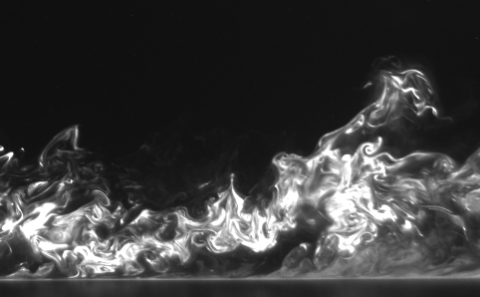Prestigious Fellowship for Southampton Engineering researcher to investigate indoor air pollution

A Southampton Engineering researcher has been awarded a prestigious government fellowship to investigate the spread of indoor air pollutants for advancing national security, and improving the energy efficiency of buildings and occupants’ wellbeing.
Dr Desmond Lim is one of nine researchers who were recently named as UK Intelligence Community Postdoctoral Research Fellows. The Fellows are being funded to develop new technologies in a range of areas including detecting and protecting against malicious drones, investigating the movement of pollutants in indoor spaces and improving radar imaging.
Desmond, who is based in the Experimental Fluid Mechanics group in Aeronautical and Astronautical Engineering, at Southampton, will focus his Fellowship on the topic of indoor air pollution. With people spending the majority of their time indoors where the concentration of air pollutants is often higher than outdoors, he will lead an experimental investigation focusing on the fundamental processes in indoor airflows and the eddy diffusivity of pollutants.
Desmond said: “The air we breathe is important to our health and productivity. We spend approximately 93% of our time in indoor spaces which include residential homes, schools, workplaces and commercial buildings. Air is often more polluted indoors, and long-term exposure to air pollutants can have lifelong health implications.
“Despite this, there has been relatively limited scientific inquisition on indoor air quality and the eddy diffusion of air pollutants. At Southampton, we are trying to improve our understanding of indoor air pollution from the fundamental fluid dynamics perspective by performing water tunnel experiments that are dynamically similar to air.
“By providing insights into key physical processes and how they relate to scalar transport and eddy diffusivity, we aim to improve numerical and mathematical models that can accurately predict the dispersions of air pollutants. This can improve building ventilation designs, occupants' health, and better inform government agencies responsible for public health and national defence policies.
“Clean air for future generations starts with us today.”
The UK Intelligence Community Postdoctoral Research Fellowships are offered by the Government Office for Science and are administered by the Royal Academy of Engineering. Recipients receive funding for at least two years of their project and mentorship from a Fellow of the Academy as well as an advisor from the intelligence community. They aim to provide a vital link between academia and the intelligence community and support cutting-edge work that can assist the intelligence community and also provide mentoring support to a new generation of engineers.
Desmond has received just under £200,000 funding for his Fellowship.
Fellow Southampton student Dr Mahmoud Wagih Mohamed, from Electronics and Computer Science, has also been awarded a UK Intelligence Community Postdoctoral Research Fellowship to explore radio frequency-enabled multi-source energy harvesting in inaccessible environments. He has received just under £200,000 to investigate the development of a single energy-harvesting source to power many co-located ’satellite‘ systems through safe, robust and efficient radio frequency power transmission.